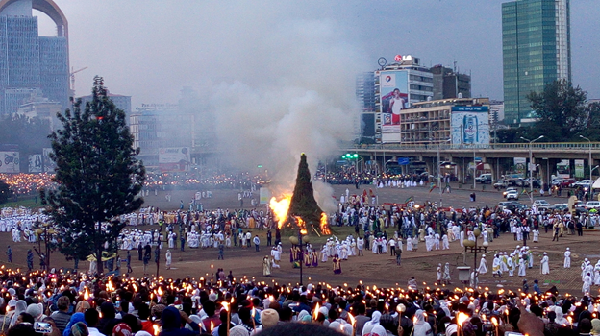
It has been almost three weeks since Ethiopians welcomed their New Year, 2016, and celebrated their Enkutatash which is the first day of their New Year colorfully.
Unlike most of the global countries, Ethiopians mark their New Year in September. This is due to the fact that Ethiopia has its own calendar system, which is seven to eight years behind the Gregorian calendar.
The month of Meskerem holds a number of cultural and religious festivals that hold significant cultural and religious importance for Ethiopians.
Yesterday, Ethiopian Christians celebrated another important event, the Meskel festival, the Finding of the True Cross that Jesus was crucified on.
As historical and religious chronicles stated, Meskel is celebrated among the faithful of Orthodox Christians Church on September 27th each year to commemorate the discovery of the True Cross by Empress Helena in the fourth century.
Using this special day as a ground, The Ethiopian Herald had an opportunity to contact individuals to reflect their views regarding the Feast of Meskel. Getahun Alemu is the President of the Ethiopia Tourism and Hotel Association. According to him, Meskel, which is also known as the feast of the Exaltation of the Holy Cross, is among the major religious and cultural festivals celebrated in Ethiopia. It commemorates the discovery of the True Cross on which Jesus Christ was crucified, as well as the return of the True Cross to Jerusalem by Empress Helena, the mother of Emperor Constantine the Great.
Meskel festival is a vibrant and significant celebration in Ethiopia, blending religious devotion with cultural traditions. For this reason, it is a time for the people to come together, express gratitude, and celebrate the discovery of the True Cross.
The colorful processions, lighting of the Demera (bonfire) that is marked on the eve of the actual day, and the joyful gatherings, spiritual songs and rites among others make the day an unforgettable event not only for local people but also foreign visitors. The festival also attests the religious heritage of Ethiopia.
Beside its religious and cultural values, Meskel festival has also significant socioeconomic value in attracting several tourists from different parts of the world and generating revenue.
Getahun also said that Ethiopia has various religious and cultural festivals that have multi-dimensional values to promote the tourism sector of the country and promote its identity. Meskel is among these festivals that brings several tourists to Ethiopia.
According to him, Meskel is not only a religious festival; it is also a time where Ethiopians show their unity, togetherness, forgiveness, and synchronization.
Several tourists frequent Ethiopia to witness its unique, historic, cultural, religious practices and tourist attractive sites. However, there is still a gap in terms of promoting tourist destinations. Identifying the demands of visitors and simplifying paying mechanisms for those who want to buy local products also need consideration, he opined.
Dejene Kassa is the other individual approached by this reporter to have his reflection about Meskel Festival. According to him, the Meskel festival marks the end of the rainy season and the beginning of the spring season in Ethiopia. It is an occasion that people give gratitude for the Creator; and pray to get a good harvest in the coming year and for abundance of opulence.
Meskel is also a time where people recall the deeds of Jesus Christ on the cross-love, forgives and mercy. For this reason whenever Meskel arrives it is common to see individuals practicing forgiveness and reconciliation.
Meskel festival is celebrated with great enthusiasm and joy throughout Ethiopia and lighting a Demera (bonfire) is one of the central parts of the event whereby not only followers of the Ethiopian Orthodox Church, but also others enjoy it most. A tall pyramid-shaped structure, decorated with flowers and green branches, is built in a Meskel-Square or any other place. In the evening, people gather around the Demera, and sing religious songs. The Demera is made to symbolize the smoke that led Empress Helena to the True Cross. The bonfire represents the triumph of light over darkness and good over evil.
As part of the celebration, people gather around the Demera and pray for forgiveness, both seeking forgiveness and extending forgiveness to others.
As some documents indicated, the tradition of “Chibo” during Meskel, it is common for people to ask for forgiveness from friends, family, and acquaintances. This practice involves individuals seeking forgiveness for any wrongdoings, mistakes, or offenses they may have committed. It is a way of starting the New Year with a clean slate and fostering reconciliation and unity within communities.
Prior to the lighting of the Demera, colorful church processions will take place at the areas where the ceremony is carried out. People adorned with their traditional white clothes gather around the bonfires and delightfully watch the breathtaking songs and chanting performed by religious icons.
The clergy dressed in colorful robes, lead prayers and perform religious rituals. After the procession, special religious services will be carried out by Sunday school students and priests.
Following the religious ceremonies, people celebrate with feasts, traditional music and dancing. Families and friends gather together to enjoy traditional Ethiopian food, including injera (a sourdough flatbread) and Doro-Wot (spicy chicken stew).
Meskel, the commemoration feast of the Finding of the True Holy Cross of Christ, is one of the Intangible Cultural Heritages of Humanity registered by the United Nations Educational, Scientific and Cultural Organization (UNESCO). The heritage was inscribed in 2013.
BY LEULSEGED WORKU
THE ETHIOPIAN HERALD FRIDAY 29 SEPTEMBER 2023





